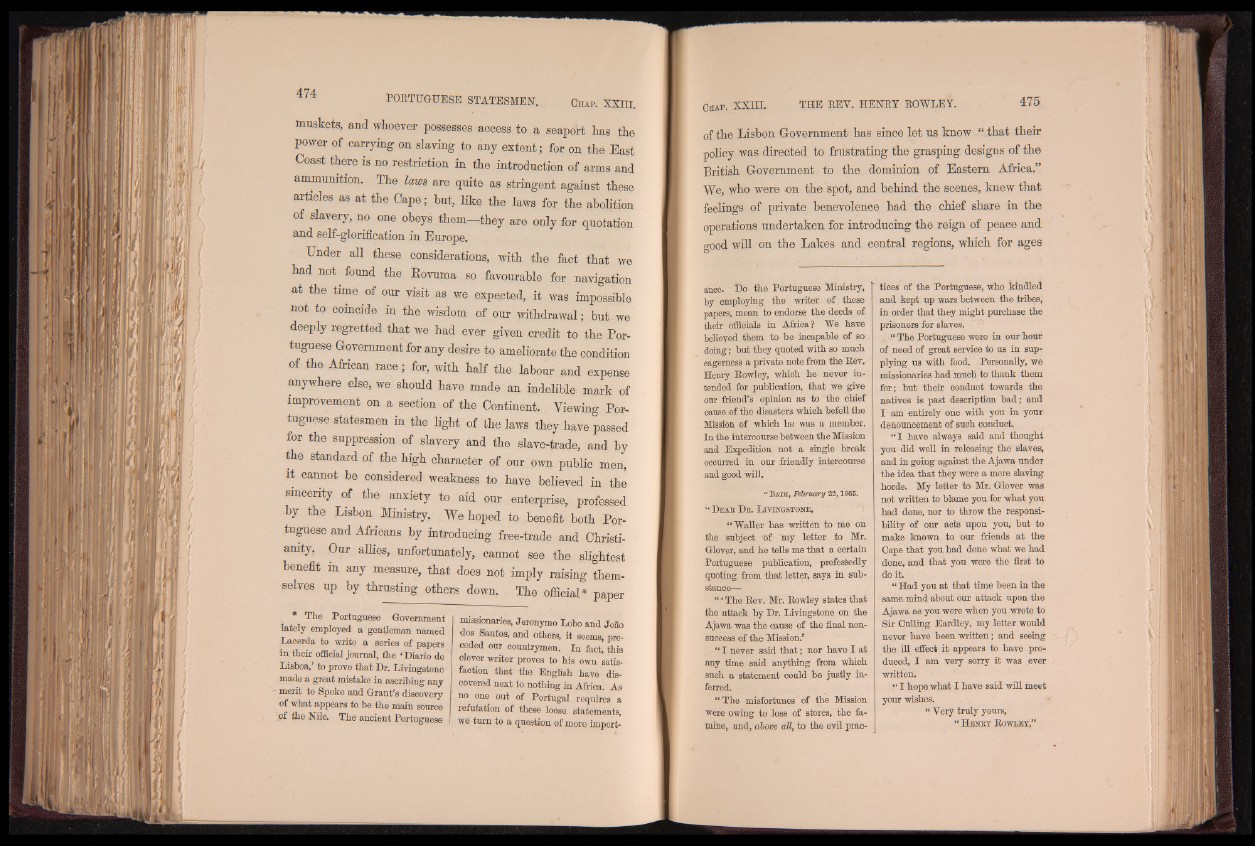
muskets, and whoever possesses access to a seaport has the
power of carrying on slaving to any extent; for on the East
Coast there is no restriction in the introduction of arms and
ammunition. The laws are quite as stringent against these
articles as at the Cape; but, like the laws for the abolition
of slavery, no one obeys them—they are only for quotation
and self-glorification in Europe.
Under all these considerations, with the fact that we
had not found the Bovuma so favourable for navigation
at the time of our visit as we expected, it was impossible
not to coincide in the wisdom of our withdrawal; but we
deeply regretted that we had ever given credit to the Portuguese
Government for any desire to ameliorate the condition
of the African race; for, with half the labour and expense
anywhere else, we should have made an indelible, mark of
improvement on a section of the Continent. Viewing Portuguese
statesmen in the light of the laws they have passed
for the suppression of slavery and the slave-trade, and by
the standard of the high character of our own public men,
it cannot be considered weakness to have believed in the
sincerity of the anxiety to aid our enterprise, professed
by the Lisbon Ministry. We hoped to benefit both Portuguese
and Africans by introducing free-trade and Christianity,
Our allies, unfortunately, cannot see the slightest
benefit in any measure, that does not imply raising themselves
up by thrusting others down. The official* paper
* The Portuguese Government
lately employed a gentleman named
Laeerda to write a series of papers
in their official journal, the ‘Diario de
Lisboa,’ to prove that Dr. Livingstone
made a great mistake in ascribing any
- merit to Speke and Grant’s discovery
of what appears to be the main source
of the Nile. The ancient Portuguese
missionaries, Jeronymo Lobo and JoSo
dos Santos, and others, it seems, preceded
our countrymen. In fact, this
clever writer proves to his own satisfaction
that the English have discovered
next to nothing in Africa. As
no one out of Portugal requires a
refutation of these loose statements,
we turn to a question of more importof
the Lisbon Government has since let us know “.that their
policy was directed to frustrating the grasping designs of the
British Government to the dominion of Eastern Africa.”
We, who were -on the spot, and behind the scenes, knew that
feelings of private benevolence had the chief share in the
operations undertaken for introducing the reign of peace and
good will on the Lakes and central regions, which for ages
aace. Do the Portuguese Ministry,
by employing the writer of these
papers, mean, to endorse the deeds pf
their officials in Africa? We have
belieyed them to be incapable of so
doing; but they quoted with so much
eagerness a private note from the Rev.
Henry Rowley, which he never intended
for publication, that we give
our friend’s opinion as to the chief
cause of the disasters which befell the
Mission of which he was a member.
In the intercourse between the Mission
and Expedition not a single break
occurred in our friendly intercourse
and good will.
“ B a t h , Februa/ry 2 2 ,1 8 6 5 .
“ D eAB D k. LmNGSTOHE,
“Waller has written to me on
the subject Of 'my letter to Mr.
Glover, and he tells me that a certain
Portuguese publication, professedly
quoting from that letter, says in substance—
“ ‘ The Rev. Mr. Rowley states that
the attack by Dr. Livingstone on the
Ajawa was the cause of the final nonsuccess
of the Mission.’
" I never said th a t; nor have I at
any time said anything from which
such a statement could be justly inferred.
“ The misfortunes of the Mission
■were owing to loss of stores, the famine,
and, above all, to the evil practices
of the Portuguese, who kindled
and kept up wars between the tribes,
in order that they might purchase the
prisoners for slaves.
“ The Portuguese were in our hour
of need of great service to us in supplying
us with food. Personally, we
missionaries had much to thank them
for; but their conduct towards the
natives is past description bad ; and
I am entirely one with you in your
denouncement of such conduct,
“ I have always said and thought
you did well in releasing the slaves,
and in going against the Ajawa under
the idea that they were a mere slaving
horde. My letter to Mr. Glover was
not written to blame you for what you
had done, nor to throw the responsibility
of our acts upon you, but to
make known to our friends at the
Cape that you had done what we had
done, and that you were the first to
do it.
“ Had you at that time been in the
same mind about our attack upon the
Ajawa as you were when you wrote to
Sir Culling Eardley, my letter would
never have been written ; and seeing
the ill effect it appears to have produced,
I am very sorry it was ever
written.
“ I hope what I have said will meet
your wishes.
“ Very truly yours,
“ H enry Rowley,”